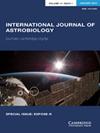The Noonday argument: fine-graining, indexicals, and the nature of Copernican reasoning
IF 1
4区 物理与天体物理
Q3 ASTRONOMY & ASTROPHYSICS
引用次数: 1
Abstract
Typicality arguments attempt to use the Copernican Principle to draw conclusions about the cosmos and presently unknown conscious beings within it, including extraterrestrial intelligences (ETI). The most notorious is the Doomsday Argument, which purports to constrain humanity's future from its current lifespan alone. These arguments rest on a likelihood calculation that penalizes models in proportion to the number of distinguishable observers. I argue that such reasoning leads to solipsism, the belief that one is the only being in the world, and is therefore unacceptable. Using variants of the ‘Sleeping Beauty’ thought experiment as a guide, I present a framework for evaluating observations in a large cosmos: Weighted Fine Graining (WFG). WFG requires the construction of specific models of physical outcomes and observations. Valid typicality arguments then emerge from the combinatorial properties of third-person physical microhypotheses. Indexical (observer-relative) facts do not directly constrain physical theories, but instead weight different provisional evaluations of credence. As indexical knowledge changes, the weights shift. I show that the self-applied Doomsday Argument fails in WFG, even though it can work for an external observer. I argue that the Copernican Principle does not let us apply self-observations to constrain ETIs.正午论证:细粒度、指数和哥白尼推理的本质
典型性论点试图利用哥白尼原理得出关于宇宙和其中目前未知的有意识存在的结论,包括地外智能(ETI)。最臭名昭著的是“世界末日论”,该论旨在将人类的未来仅限于其当前的寿命。这些论点建立在可能性计算的基础上,该计算根据可区分观察者的数量对模型进行惩罚。我认为,这种推理导致了唯我论,即认为一个人是世界上唯一的存在,因此是不可接受的。以“睡美人”思想实验的变体为指导,我提出了一个评估大宇宙观测结果的框架:加权细粒度(WFG)。WFG需要构建具体的物理结果和观测模型。第三人称物理微观假设的组合性质产生了有效的典型性论点。指数(观察者相对)事实并不直接约束物理理论,而是对不同的可信度临时评估进行加权。随着指数知识的变化,权重也发生了变化。我展示了自应用的末日论证在WFG中失败,尽管它可以为外部观察者工作。我认为哥白尼原则不允许我们应用自我观察来约束ETI。
本文章由计算机程序翻译,如有差异,请以英文原文为准。
求助全文
约1分钟内获得全文
求助全文
来源期刊

International Journal of Astrobiology
地学天文-地球科学综合
CiteScore
3.70
自引率
11.80%
发文量
45
审稿时长
>12 weeks
期刊介绍:
International Journal of Astrobiology is the peer-reviewed forum for practitioners in this exciting interdisciplinary field. Coverage includes cosmic prebiotic chemistry, planetary evolution, the search for planetary systems and habitable zones, extremophile biology and experimental simulation of extraterrestrial environments, Mars as an abode of life, life detection in our solar system and beyond, the search for extraterrestrial intelligence, the history of the science of astrobiology, as well as societal and educational aspects of astrobiology. Occasionally an issue of the journal is devoted to the keynote plenary research papers from an international meeting. A notable feature of the journal is the global distribution of its authors.
 求助内容:
求助内容: 应助结果提醒方式:
应助结果提醒方式:


